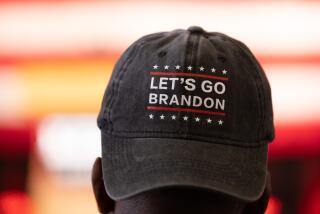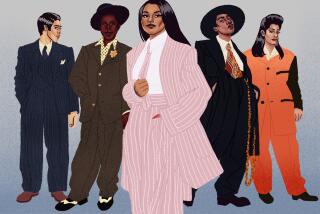Long Story Short
- Share via
HAMILTON, Bermuda — Representing Bermuda at the Athens Olympics last year, Cabinet minister Dale Butler bowed to tradition and dressed formally. Like many other men, he wore a shirt, a tie and a jacket. Unlike other men, he also wore knee socks and short pants.
The ensemble was a hit with the ladies, Butler said, but as he was leaving a reception there, he encountered a Saudi prince in the elevator. The robed royal looked askance at him, then offered to provide him with the fabric needed to complete his clothing, Butler recalled with amusement.
“Later I received an invitation from him to an event they were hosting,” he said. “He’d written on it, ‘Long pants required.’ ”
Persian Gulf princes aren’t the only ones questioning the advisability of grown men baring their knees. Bermuda shorts, a bequest of Britain’s military and still deemed suitable for meeting the queen, are headed the way of the erstwhile British empire, a victim of time and taste.
Increasingly, the national dress of this British colony is worn only by a diminishing circle of elderly white gentlemen and workers in the hospitality industry, who put them on solely for the paycheck.
Bermuda’s residents may still drive on the left and play cricket instead of baseball, but a tectonic cultural shift has occurred since the industrial barons of Boston, New York and Baltimore began turning to this temperate island of 65,000 people to escape icy winters and stifling summer heat. Now a haven for U.S. banking and insurance companies seeking tax breaks, its ties to Britain and its traditions have been unraveling under the friction of North American influences, including hip-hop and affirmative action.
“I would say it has been changing more than diminishing, going from dress attire to a more casual look,” said Laurence Trimingham, whose 120-year-old Front Street shop was the premier purveyor of the classic shorts-and-socks outfit before going out of business in late July.
“Originally, the shorts came to us from the British military summer uniform,” the clothier said. “As that influence in the colonies has gone away, so have the shorts.”
The just-above-the-knee tailored shorts are considered formal attire only if worn with cuffed knee socks and slip-on leather shoes, preferably penny loafers. In the shorts’ heyday, the white oligarchy that ruled the colony wore them to tennis matches, elegant dinners and showcase events like the annual Cup Match cricket games. Less than a decade ago, they were deemed appropriate wear for Parliament.
John Swan, a former prime minister who led a failed referendum on independence a decade ago, sees Bermuda’s evolution out of colonial trappings as an induction into the global community. He is proud of his country -- most natives of Bermuda see themselves as having a distinct national identity despite their colonial status -- for achieving levels of prosperity, democracy and racial equality that the world’s most powerful countries can only envy.
“The black community in Bermuda does better than just about any black community in the world,” said Swan, who became the island’s second black prime minister 23 years ago. “The United States couldn’t even imagine a black president. It hasn’t even had a female. All these things we take for granted.”
Bermuda may be divesting itself of its colonial identity, he suggested, because it has arrived as a major international business destination under its own steam.
“In less than a generation, we’ve made a transition from servitude to service,” he said of the economy. Bermuda, long dependent on the sailing and tennis sets for revenue, now has 13,000 international management, insurance and financial companies.
On the shorts issue, Swan takes the long view.
“I have always felt that I wanted to be a traditional, classically dressed Bermudian, as a public figure,” he said, arguing that a suit and tie project a more serious and accomplished image than do shorts and knee socks.
“In the context of Bermuda, they are seen as business attire, but in the context of the international community, they are not,” he said. Swan noted that other former colonies abandoned the shorts when they became independent. “In Barbados, for example, they don’t like you wearing shorts to work. They see it as a throwback to the colonial days.”
Bermuda shops still sell about 20,000 pairs of the shorts each year, said David Hamshere, president of the English Sports Shop, which, with last month’s demise of Trimingham Brothers, is now the leading provider of the island’s namesake fashion. Hamshere says Bermuda shorts haven’t so much gone out of style as they have evolved into newly popular casual attire.
“There’s a great deal less formality in Bermuda now than there was before the business community changed from tourism to reinsurance,” he said. “The dress-down Friday has almost become a daily matter.”
With Trimingham and its subsidiary Smith’s out of the picture, the English Sports Shop has inherited the convention business, which accounts for special orders of up to 250 matching Bermuda short suits, as well as most of the school and hotel uniform contracts.
Hamshere, dressed in tailored shorts, knee socks, shirt, tie and navy blazer, laments that the “younger element” often breaks tradition by omitting the hosiery, tie and jacket.
“There’s something comforting when one is dressed for the occasion,” Hamshere said. “Shakespeare got it right: ‘Clothes maketh the man.’ ”
Would he wear the shorts to a business meeting in New York or London?
“Certainly not,” he responded in horror. “People would look and laugh.”
That risk of being perceived as slightly comic has played a significant role in driving today’s movers and shakers away from short pants.
“Bermuda shorts denote the old, traditional Bermuda,” said Scott Simmons, an importer of European tile and spokesman for the ruling Progressive Labor Party. “They evoke the image of a gentlemen’s club, a brandy-and-cigar-room society inclusive of the few and exclusive of the rest.”
Dapper in a tailored blue suit (with long pants) and exuding an English accent despite his North American education, Simmons, who is black, said he eschewed the shorts because they had “a tendency to appear too relaxed.”
“When you’re dealing every day with corporate America, you want Bermuda to appear a serious destination,” he said.
Other young black businessmen and politicians regard the attire as a vestige of a less egalitarian age.
“They’re identified with a certain lifestyle, mostly older men in the business community,” said Desmond Richardson, a 37-year-old building contractor who says he hasn’t worn the shorts since elementary school, when they were part of the uniform. “People who want to wear shorts now wear cargo shorts.”
He alluded to a subtle resentment of colonial imposition, noting that the shorts were introduced here as the British military occupiers’ idea of “respectable attire.”
“It was like they were saying to us, ‘You must look smart all the time,’ ” said Richardson, decked in a white pullover and navy trousers. “Now people wear whatever they feel most comfortable in.”
Fashion may be fleeting, but some who track social trends here nevertheless mourn the demise of a style of dress with which the island has long been equated.
“You won’t find any young men in Bermuda shorts, although I wish they would wear them instead of these baggy pants hanging on them nowadays,” said Ruth Thomas, the island’s former cultural affairs official. “Bermuda shorts have a certain dignity, but they must be worn in a special way, and Americans have turned them into casual attire now.”
In fact, most men younger than 50, if they wear shorts at all, wear them with open-collared shirts or T-shirts and well-broken-in boat shoes, sans socks.
“Old Bermudian white families are an endangered species,” said Thomas, noting that the colonial elite began leaving in the 1960s, when universal suffrage was finally achieved in Bermuda. Each subsequent election brought more of the black majority into the power structures, eroding the prevailing British traditions.
At Aston & Gunn, next door to the empty Trimingham Brothers, manager Chris Creamer said the posh men’s shop stopped carrying the shorts a few years ago when “we decided we wanted to offer a more fashionable alternative.” It now stocks the European designer suits and sportswear popular with young professionals.
“I have got a pair, for the right occasion,” said Creamer, who moved here from Britain 27 years ago. He recalls donning them for the odd golf club or tennis event, but he hasn’t dusted them off much in the 15 years since the influx of U.S. executives began.
“It came with the exempt companies,” he said, referring to the Wall Street invasion. “The IT guys go to work in T-shirts, jeans and sandals.”
Those loyal to the formal attire say they wear it out of pride in the traditions of empire -- or because they have to.
Thomas Jones, 56, has spent 30 years in the tourism industry, mostly in luxury hotels where doormen, waiters and concierges are dressed in each establishment’s own version of the national costume.
“I’ve always been into the colors,” said Jones, who can choose his own outfits now that he’s a private taxi dispatcher. He turned out a pink-stockinged foot in matching loafer for inspection, drawing a hand to his chest to show that his shirt and tie matched them.
“But we’re a disappearing generation,” Jones said. “The young crowd, they wear the baggies -- what we used to call knickerbockers. It looks just awful.”
More to Read
Sign up for Essential California
The most important California stories and recommendations in your inbox every morning.
You may occasionally receive promotional content from the Los Angeles Times.











